
16 minute read
Oct Jameel Observatory launch
by thedickvet
Partnership for data-driven early response to hunger launched
Leading research and humanitarian agencies have joined forces to harness data and technology in a bid to stop climate shocks resulting in hunger in vulnerable livestock farming communities.
Advertisement
The Jameel Observatory for Food Security Early Action is being created to help tackle the growing threat to people in the world’s drylands posed by the increasing severity and frequency of climate-related disasters.
The venture, which was launched at COP26, brings together the expertise of five partners – the University of Edinburgh, the International Livestock Research Institute (ILRI), Save the Children, the Abdul Latif Jameel Poverty Action Lab (J-PAL), and Community Jameel.
The partnership will connect cutting-edge technology and data surveillance on early warning signs of severe weather and systemic climate change with community-driven applications and interventions.
The Jameel Observatory will engage with agencies that work with farmers to develop and apply digital and analytical tools that help them shape their own food security, nutrition and livelihoods.
Researchers plan to use community-level data together with satellites, drones, weather data and remote sensing to understand, prepare for, and mitigate the likely impact of climate shocks.
Drylands, which are home to billions and make up 40 per cent of the word’s land area, are at risk from fluctuating rainfall, drought, rising temperatures and land degradation. These create insecurity and conflict caused by competition for resources.
By the time the full force of these crises is felt and hunger takes hold it is often too late to respond effectively, experts say.
Each partner will bring specific insights to the work of the Jameel Observatory. The University of Edinburgh will use its expertise in data-driven innovation to combine data, information and local knowledge to better predict climate risks, encourage coordinated actions and guide interventions.
The Jameel Observatory will be based at the International Livestock Research
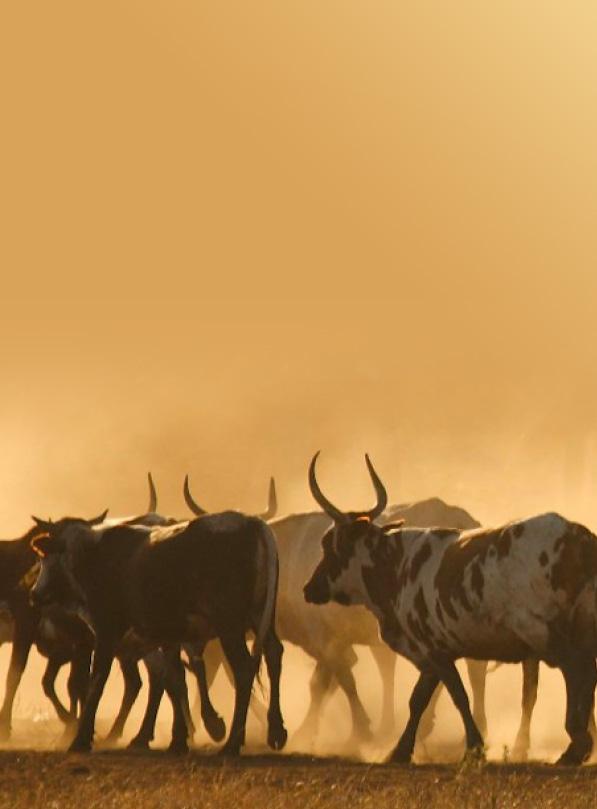
Institute (ILRI) in East Africa. ILRI works with partners throughout the continent and is home to projects focused on food security and environmental research in dry lands.
Save the Children brings a wealth of experience supporting communities to respond, prepare and adapt. The Abdul Latif Jameel Poverty Action Lab will connect Jameel Observatory with teams of researchers to help assess the initiative’s interventions. J-PAL will also share evidence on effective climate change and adaptation programs from existing literature.
Community Jameel is an international organisation tackling some of the world’s most urgent issues and challenges, based on evidence, science, data and technology. It is providing its expertise in establishing collaborative institutes and research programmes for the past 75 years. “No single organisation has the ability to address the complexities facing drylands communities. With expertise in data-driven innovation in a range of contexts, the University of Edinburgh is well placed to lead this partnership by bringing pastoralist communities together with experts in big data, earth observation and food security.” - Professor Alan Duncan, Global Academy of Agriculture and Food Security. “The Jameel Observatory’s approach will enable a shift from reacting to the climate crisis to data-driven anticipation and adaptation, helping to find better solutions to the challenge of food insecurity.”
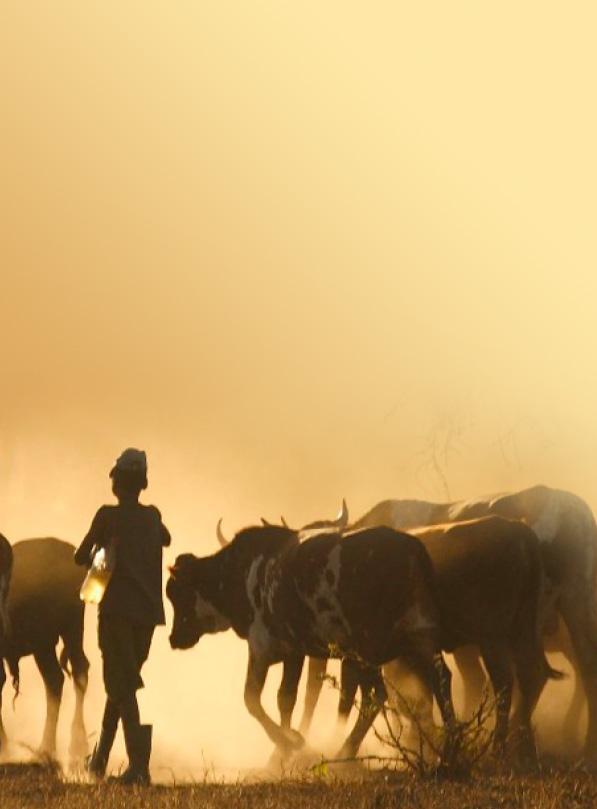
- George Richards, Director of Community Jameel
Agriculture and Food Security Partnership to deliver datadriven tech to farmers
The Global Academy of Agriculture and Food Security is forming a partnership with software development company Trinity AgTech, with the aim of helping farmers achieve greater profitability and environmental progress.
Under the collaboration, the organisations will work together to apply data-driven innovation to farming. They will seek to develop technologies that will add value to supply chains, to help producers and benefit the environment.
Their partnership is formed at a time when food production and land use management involve complex challenges relating to climate change, poor nutrition and lack of biodiversity.
In addition to the partnership, Professor
Geoff Simm, Director of the Academy and the University’s Chair of Global Agriculture and Food Security, has joined Trinity AgTech’s
Scientific Board.
“We’re in the middle of climate change, malnutrition and biodiversity crises with food, farming and land use at the heart of these. These issues are complicated and interconnected but through data-driven innovation – a priority theme for us in the
University of Edinburgh – we can empower farmers to create real change.” - Professor Geoff Simm, Director, Global
Academy of Agriculture and Food Security. “Most of our farmers’ talent has been untapped and under-nurtured and that genie needs to be freed from the bottle. At Trinity AgTech we believe that it will be the genius of the many that will deliver farming a flourishing future and ensure we have vibrant rural communities.”
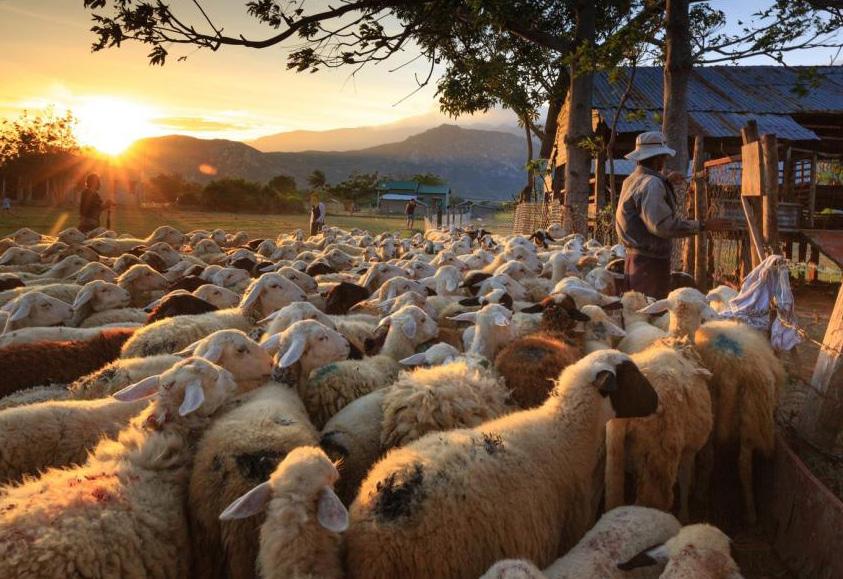
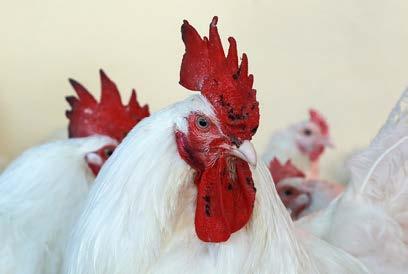
Changing markets put pressure on livestock sector
Changes in the livestock sector are likely to be influenced by market pressures driven by concerns over the environmental and health aspects of producing and eating meat, according to a review study published in Animal.
Changing consumer preferences, as well as pressures from sector investors and government concerned by the risks and impacts of raising livestock and of meat consumption, could prompt a response from producers, research indicates.
Researchers from the Global Academy of Agriculture and Food Security reviewed economic studies of sustainable livestock systems, considering aspects that are likely to affect demand in the sector.
The global consumption of meat is converging, as consumers in developed regions opt to eat less meat and better products including meat substitutes, while meat demand is growing in low- and middle-income countries. The sector also faces concerns from investors, most of which are related to intensive production systems.
Livestock production is expected to account for 80 per cent of all greenhouse emissions by the year 2050, with similar risks emerging in relation to antimicrobial resistance and land use. Producers may need to respond with technical innovation or revised production practices to ensure sustainability. Meanwhile, policymakers must manage the impacts of these so-called social costs on health, the study found.
Consensus breaks out on net-zero farming
Professor Geoff Simm, Director of the Global Academy of Agriculture and Food Security, took part in a panel of farmers, academics and NGO representatives who have published a consensus pathway for making Scottish farming climate compatible. In a polarised debate, Farming for 1.5 Inquiry was able to set out a credible way forward by bringing different perspectives and aspirations around the same table.
Following a two-year Inquiry, the Farming for 1.5 panel produced a consensus set of policy recommendations, aimed at taking the sector from where it is today to net zero in 2045.
The panel heard evidence from experts on farming practices, environmental impacts and behavioural change, and conducted farm visits. The key recommendations of the report include: whole farm contracts to deliver on farming and nature from 2024; reducing total emissions from agriculture while maintaining food production per capita; rapid uptake in low methane breeding for cows and sheep.
Health warnings can nudge consumers to eat less meat
Labels warning of the harmful health effects of red meat are more likely to dissuade consumers than labelling relating to its associated environmental impact, research shows.
In a study involving the Global Academy of Agriculture and Food Security, consumers who were given the option of ready meals labelled as harmful to the environment, health, or both, were more likely to be influenced by health warnings, especially those relating to a specific condition.
The findings suggest that warning labels may aid efforts to deliver the targets of the recently released National Food Strategy in the UK, which suggests nudging consumer habits to deliver a 30 per cent reduction in meat consumption over the next 10 years.
Warning labels alone will not make significant headway, but could support progress as part of a package of measures to nudge consumer action, scientists say.
In experiments with warning labels, specific health warnings associated with red meat – relating to colon and rectal cancer – were found to be more discouraging among consumers than a general warning of risk of early death.
The impact of warnings on product selection was stronger among people who ate more meat, the outcomes suggest, which may be valuable in targeting this important demographic.
The findings chime with previous studies showing that people adopt vegetarianism for health reasons rather than meat’s impact on the environment, regardless of their views on climate change.
Despite little evidence of shifting consumer behaviour for the environmental impact of meat production, researchers suggest that labelling could raise awareness of this aspect and influence shoppers in future.
The research team was led by the University of North Carolina Chapel Hill and included the University of South Carolina Arnold School of Public Health, Harvard TH Chan School of Public Health, Harvard Pilgrim Health Care Institute, and the University of Amsterdam.
- Dr Lindsay Jaacks, Chancellor’s Fellow Global Challenges, Global Academy of Agriculture and Food Security.
Monocroppers at increased risk of poor diets in lockdown
During the most restrictive part of Covid-19 lockdown in India, farmers planting only one type of crop were more likely to experience a decline in diet quality than those cultivating two or more.
Findings are based on surveys of farmers by researchers from the Public Health Foundation of India, the Centre for Sustainable Agriculture (Hyderabad), Harvard University (US), and the
Global Academy of Agriculture and Food Security.
Crop diversity influences diets through two major pathways: home consumption and increased income, which can be used to buy food.
During the initial lockdown, access to markets was restricted and demand dropped. Therefore, the second pathway was largely blocked.
On average, farmers consumed just two food groups per day. Staples and dairy were the most commonly eaten, followed by vegetables. The number of foods consumed fell most in the initial phase of the lockdown, from May to June 2020, and then rebounded slightly as the lockdown was eased from June to August.
Farmers who grew a single crop, in most cases rice, were approximately twice as likely to eat fewer types of food compared with those who cultivated two or more crops.
About half of farmers had a kitchen garden, and they were significantly less likely to experience a decline in the number of food groups consumed throughout the entire lockdown.
Kaela Connors, a Master’s student at Harvard
University and lead author of the study, said, “Our findings clearly demonstrate that diversifying production systems may be important for safeguarding nutritional security in the event of other large-scale global shocks such as future pandemics and climate change.” “Our findings clearly demonstrate that diversifying production systems may be important for safeguarding nutritional security in the event of other large-scale global shocks such as future pandemics and climate change.”
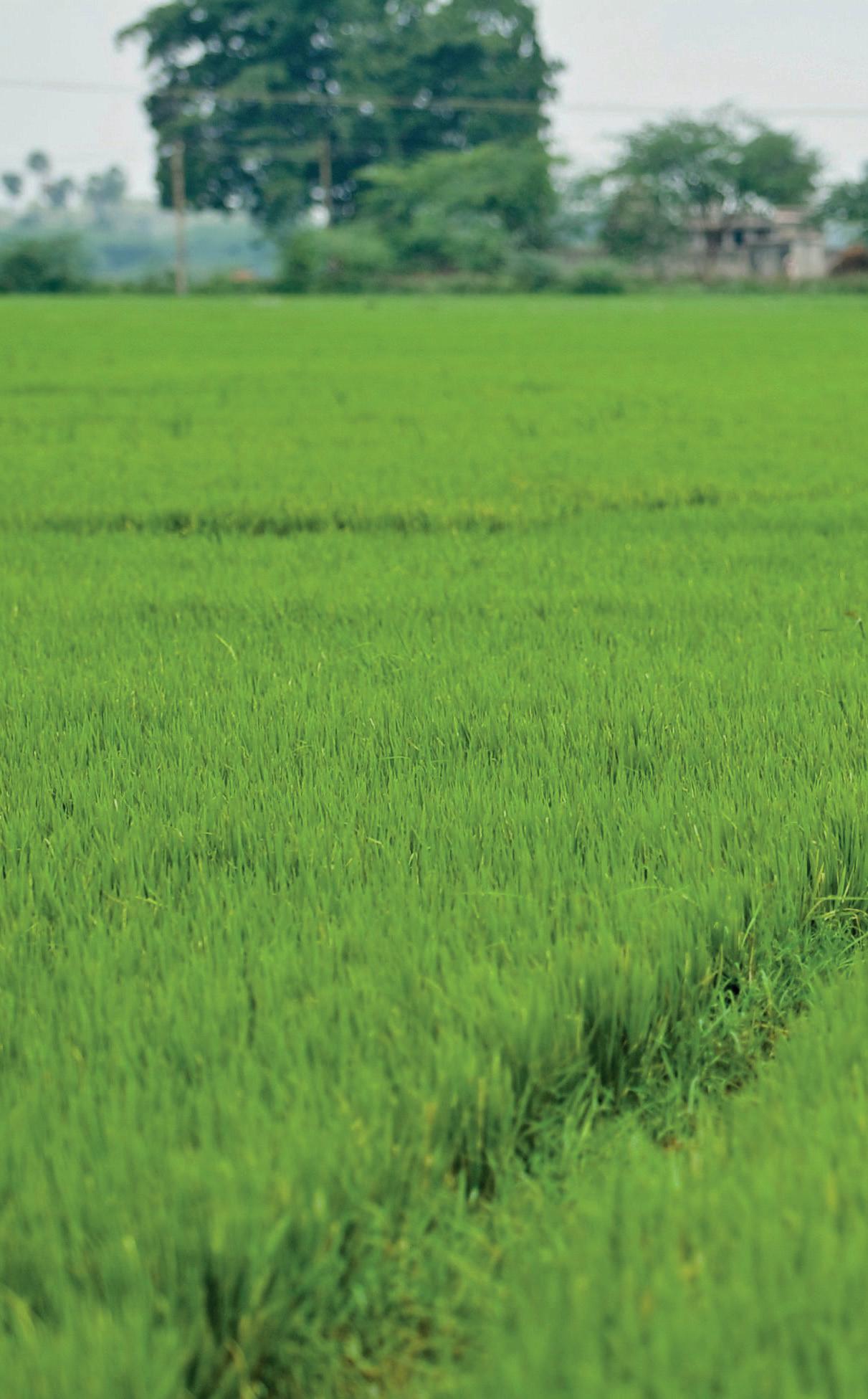
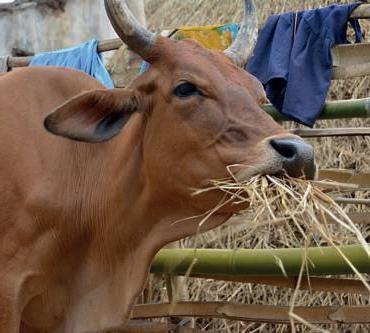
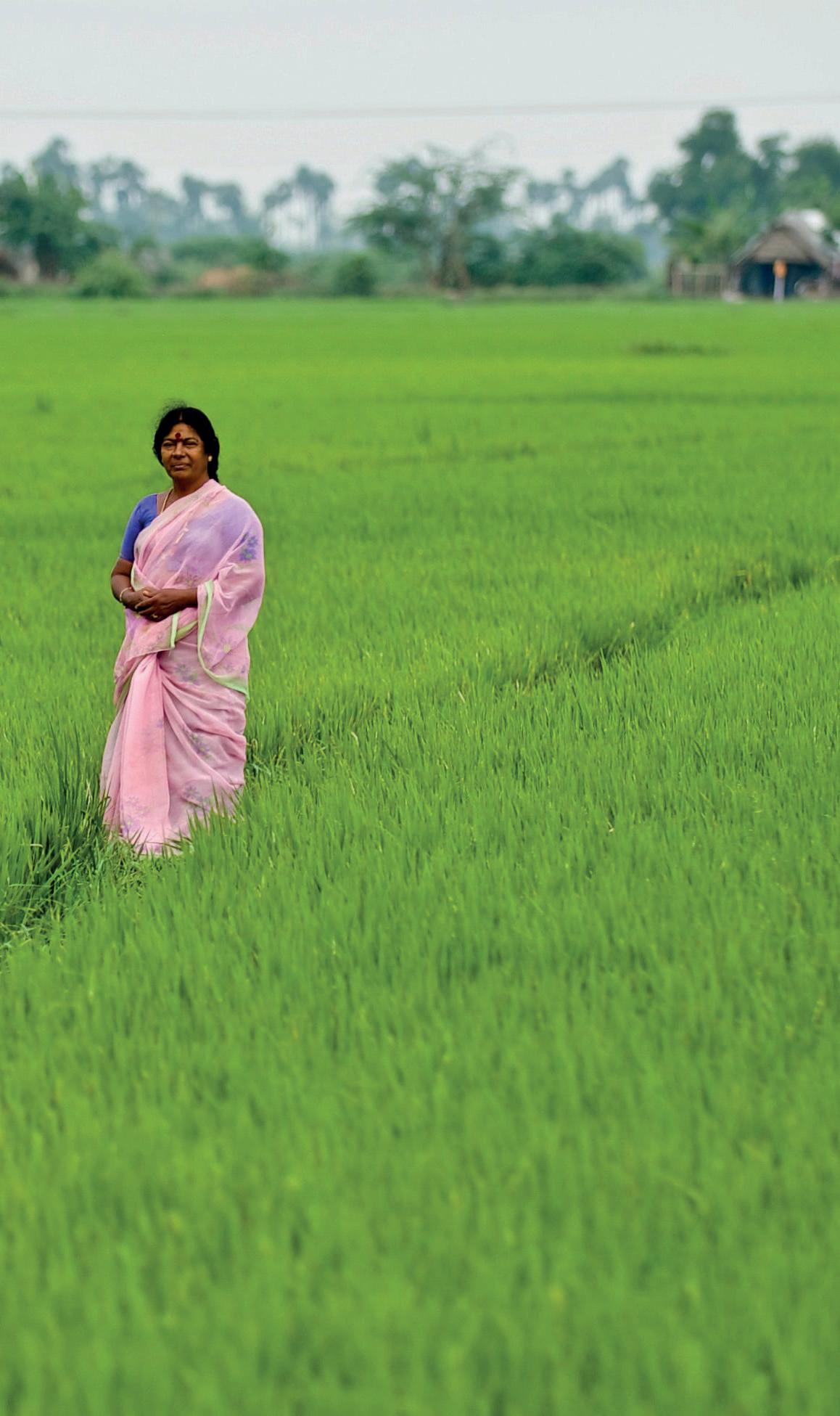
Crowd-sourced data shows what livestock eat
A new tool makes it possible for farmers to visually explore standardised data on what livestock eat in low-and middle-income countries.
The data behind the visualisation was generated using the Feed Assessment Tool (FEAST), and is the product of thousands of data uploads from more than 150 sites in 14 countries.
It aims to give farmers, extension workers, researchers and policymakers working on livestock a good understanding of animal feeds.
Researchers at the Global Academy of Agriculture and Food Security and the International Livestock Research Institute (ILRI) helped initiate the development of the FEAST Tool, which helps users assess overall availability of feeds, the quality, and the seasonality in a particular site.
Users collect the data in a standardised format, and are encouraged to submit their results to the open access FEAST Global Data repository.
- Professor Alan Duncan Global Academy for Agriculture and Food Security, and International Livestock Research Institute (ILRI)
Innovation Roslin Innovation Centre – A Year In Review
There is no doubt the impact and restrictions imposed as a result of Covid-19 made the past year another challenging one for all of us. At the
Roslin Innovation Centre, we implemented new ways of working and operating within public areas, lab and office space for the safety of colleagues, tenants and visitors. In the last few months, we have welcomed the gradual return of our community to Roslin
Innovation Centre and the Easter Bush Campus.
We can once again fully experience the energy and enthusiasm for collaboration, and the drive for innovation and business growth, as we work together to tackle global challenges and those closer to home – head on. We have been ‘open for business’ now for over four years. Since we opened in August 2017 our unique business gateway to innovation has continued to nurture entrepreneurship, growth and collaboration within the dynamic environment of the Easter Bush Campus. Our occupancy is now at the optimal target of 85 per cent, with 31 tenant companies – ranging from established local and international organisations, start-ups and spin-outs, to community interest companies. Our entrepreneurs continue to shine. Beta
Bugs Ltd, an insect farming innovator, expanded their team and launched a new insect breeding facility on Campus. The entrepreneurial company develop and distribute high-performance breeds of
Black Soldier Fly for the ‘insects as feed’ industry. Ishani Malhotra, MD and founder of
Carcinotech Ltd, a MedTech company, has achieved significant success and recognition for the innovative manufacturing of 3D cancer research models and joins a six-month
AI Accelerator – part of a wider Data Driven
Entrepreneurship (DDE) programme at the Bayes
Centre - together with neighbouring tenant and fish health experts, Pulcea Ltd, also being part of the current DDE cohort. Rhizocore Technologies Ltd, an applied mycology start-up developing novel propagation techniques for woodland restoration, joined us as part of Food & Agriculture Science Transformer (FAST) in partnership with Deep Science Ventures. FAST, a paradigm shift in scientific company creation, is a pilot programme to develop and build new high growth tech companies for Scotland’s agricultural bioeconomy, through an iterative process that delivers founding team members, advisors, technologies, customers and investors, all designed to succeed and scale. Another one to watch is Wobble Genomics Ltd, a spin-out of the Roslin Institute, providing biochemical and bioinformatic solutions for gene biomarker discovery, with a successful £1.2 million investment round supporting expansion of the team and relocation to Roslin Innovation Centre, and also helping to drive sales and demonstrate
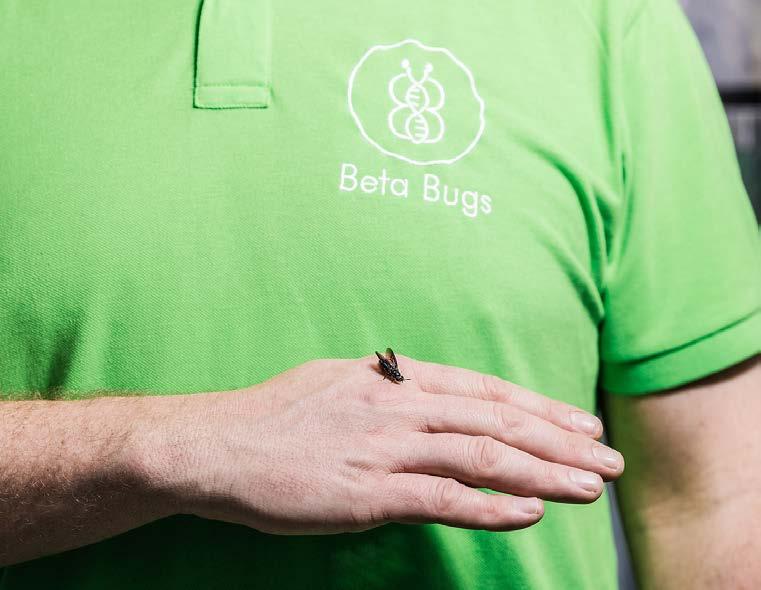
Beta Bugs Ltd, an insect farming innovator.

- John Mackenzie, CEO Roslin Innovation Centre
the company’s ability to improve clinical outcomes. The recent arrival of Dyneval Ltd is also a great strategic fit for Roslin Innovation Centre. The company is delivering world-leading innovation that could make a significant difference to the agri-food supply chain, and the drive towards more sustainable farming practices. Dyneval has secured total funding of over £1.8 million to establish a new quality control standard for semen analysis that will benefit users across the livestock production chain on a global scale. Our open plan office space is truly buzzing again ... with Beebytes, a social enterprise specialising in honeybee genetics and DNA analyses, formed by members of an expert team with research work based at the Roslin Institute, apiary management at Easter Bush Campus and King’s Buildings and holding key roles in Beekeepers’ Associations. On a regional scale, Midlothian Science Zone has put Midlothian on the B-Line, ‘insect pathways’ mapped by BugLife, in recognition of the abundance of wildflower-rich habitats ‘in the zone’ and the benefits of these to bees, butterflies and other wildlife. Meanwhile, tenant companies that joined us in the early days continue to grow. Following a successful year of collaboration, AbacusBio Ltd and global enterprise Bayer have agreed to expand their partnership in the area of predictive plant breeding. This marks the company’s largest collaboration to date, and is anticipated to have a far-reaching impact among numerous crop supply chains. Also making scientific breakthroughs in new approaches is Roslin Technologies Ltd. The
Above: The Wobble Genomics Ltd team. Below: Dyneval Ltd. company is at the centre of commercialising lab-generated cultivated meat for commercial sale. Roslin Technologies is working with partners across the globe - including those in Singapore, one of the first countries in the world to give approval to cultivated meat for human consumption. So, although this year has been very much one of Covid-19 restricted consolidation, even under these challenging times we reflect on the many positive highlights and achievements which steer us forward to a strong and optimistic position for the year ahead – and beyond. A3 Scotland 2022 is one of the key dates already highlighted on our calendar. Postponed from last year, our inaugural conference for the Animal Health, Agritech and Aquaculture (AAA) sectors is rescheduled to 26 and 27 April 2022. It has retained the high-level sponsors, including Zoetis Ltd, and features influential and expert speakers to encourage innovation, investment and collaboration under the theme ‘Transition to Net Zero’.
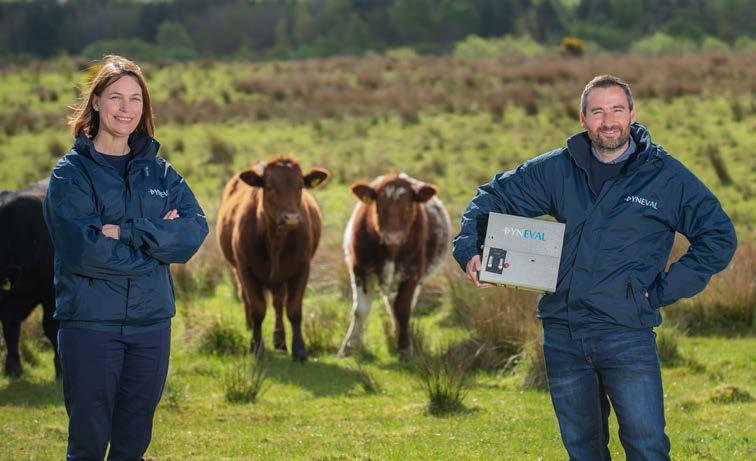
£74m investment for AgriTech Hub on campus
A£74 million investment for a new Agritech Hub will improve the efficiency and output of agricultural applications, and enhance worldwide food security.
The virtual hub will foster collaboration between researchers and companies to contribute to global food systems, work towards net zero carbon in the agritech sector, and to inform food and environmental policies.
Experts in the Hub will use data to develop genetics and health innovations for agricultural science and business, and to build initiatives and novel systems of production, such as robotics.
Work in innovative areas, such as datadriven breeding and aquaculture, will enable data generation and analysis that will improve the agriculture industry worldwide.
The Agritech Hub will be nucleated at the Royal (Dick) School of Veterinary Studies’ Easter Bush Campus – Europe’s largest concentration of animal science research expertise, with reach across the University of Edinburgh.
Investment will comprise £27 million from the UK Government, including £1.3 million from the Scottish Government, as part of the Edinburgh and South East Scotland City Region Deal.
The investment will transform the scale and impact of agricultural technology in outputs from teaching, research and innovation.
The Easter Bush AgriTech Hub aims to develop world-leading research capability in data science.
It will address skills shortages and gaps in the industry, as well as encourage graduates to set up or join micro-agritech companies.
The Hub will bring together researchers from the University and other higher education institutions, along with commercial, public and third sector organisations, in collaboration with project partners Midlothian Council.
Researchers will work with the Scottish and UK public sector, including the Animal and Plant Agency (APHA), Scottish Government’s Animal Health and Welfare Division, UK Department for Environment, Food and Rural Affairs (Defra), and industry, such as the InnovateUK Agri-Tech Centres.

“This is a very exciting time for agriscience, with transformative technology and data sharing opening up new approaches for fair and inclusive growth. The
City Region Deal will drive an innovation pipeline nucleated from Easter Bush campus in Midlothian, with reach both across our country and internationally, all built around novel research, fuelling a step change in upskilling, talent development and enterprise activities.”
-Professor Bruce Whitelaw, Interim Director, Roslin Institute









